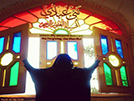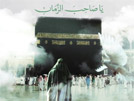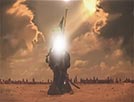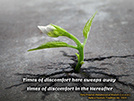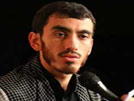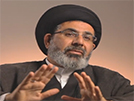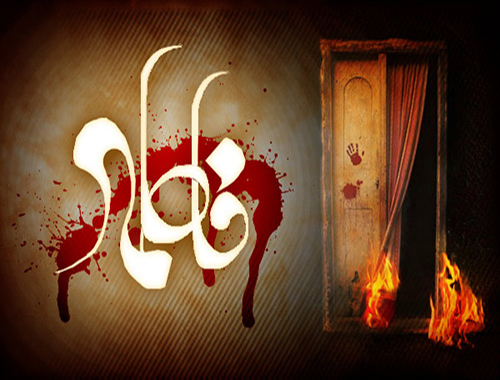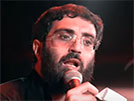
The story is about a "choice", the most important manifestation of the meaning of human being. But what kind of choice? We are all faced with several choices in our everyday life: career, friend, wife, house, major.. But in this story, the choice is much more difficult: the good and the evil. And even so, not from a philosophical, scientific, or theological perspective. Instead, the choice here is between the truthful and the deceiving religion, between the just and unjust politics, with life being the price to pay.
To further emphasize the sensitivity of the situation, the author has not put the hero of this story in the middle, equally between the right and the evil. Instead, the hero is the head of the army of the evil. On the other hand, the director of this play has to find symbols for his story to make them most effective. Should he have Promote on one side and some demons on the other side? But this makes the story too mythical...Spartacus and Crasios? No...This makes the story nationalistic and gives it a class dependent nature. How about Abraham and Nimrod? Moses and Pharaoh? Jesus and Judas? No... Again, for most of the people these are metaphysical and heavenly characters different from common ordinary people. Having them as heroes reduces the effect of the story, and causes people to admire them, but never think about following their examples in their everyday life. However, the main purpose of this story is to teach, to show the ability of the man to change, to show how it is possible for a common and even sinful man to reject all his social, family, and class ties and show a god-like change.
The history of Islam is full of contradicting features. The two lines starting from Abel (Habil) and Cain (Ghabil), existing throughout the history side by side though in different faces, have also continued in Islam. Now, both these streams are dressed in Islam, but in opposite directions. Ironically, our hero is faced to choose between the most extreme ends in each of these parties: Yazid and Hussain (A.S).
What is the name of this hero? For a historic figure, what is important is the role he plays, and not his name, since his name is something chosen for him by his family, according to his parent's taste.. On the other hand, if the story is created by an ingenious writer, he would choose a name which is relevant to the role of his hero. In this story however, our hero has been named by his mother, "Hur", as if she has been able to foresee the sensitive role his son is going to play. And thus, when the Imam of freedom attends his bloody body, just before his death, tells him: "O Hur! God bless you! You are free both in this world and in the world to come, just like what your mother called you!"
Although Hur has played a unique role in the history, the essence of his role is not just confined to himself. The meaning of his action, in fact, includes all human-beings, and indeed defines "humanity". It is what distinguishes the human-beings from other creatures, underlining the responsibility of man with respect to God, people, and himself. And Hur has not played this with words and concepts, but with love and blood. If one grasps the depth of this saying from Imam Sadegh (A.S) that "All days are Ashura, and all places are Karbala, and all months are Muharram" one readily feels the extension: "and all human-beings are Hur!"
It is by this choice that you become human. Before this choice you are nothing, you are just an existence without essence, you are standing in the middle. Thus, the man who has found "existence" through birth finds "essence" through choice. It is by this choice, that the creation of man completes, and this is exactly when the man feels this heavy burden on his shoulders and finds himself alone, as God and the nature have left him on his own on this dangerous decision.
Hur and Umar ibn Saad both have come all the way from the palace of Yazid to Karbala together and they share the same status and social class. Hur asks Omar:
"Can't you find a peaceful solution for this situation?”
"You know that if it had been up to me I would have done as what you propose, but your master Ubayd Allah ibn Ziyad did not accept a peaceful resolution!"
"So are you going to fight with this man (Hussain (A.S))?"
"Yes, by God, I will fight a battle the least consequence of which will be separated heads and broken arms!"
Now, it is evident that no longer can he play games with his religion. Now, the two separate their paths.
For Hur, Yazid's army of tens of thousands is now nothing more than a bunch of faces, without meaning. A crowd of men without selves, a group of people without hearts, those who shout but don't know why, fight but don't know for whom. Now the Jesus of love and conscience cures a blind and resurrects a dead, creating a martyr from a murderer. In a journey it is not enough to ask for the destination, but one should also ask from the origin. Thus, the length of Hur's journey becomes evident when one realizes from where he started, and to where he ended, all in half-a day's time. In his emigration from Satan to Allah, Hur did not study philosophy or theology, nor did he attend any lectures or schools. He just changed his direction, and it is in fact this "direction" which gives meaning to everything: art, science, literature, religion, prayers, hajj, Mohammad, Ali... Having started his journey, and riding his horse, he slowly leaves his Army toward Hussain. Mohajer ibn Ous, who sees him agitated and worried, asks:
"What’s wrong with you Hur? I am puzzled by your case, by God if I were asked about the bravest man in our army I wouldn’t hesitate to mention your name, and now you are so disturbed and worried?"
"I find myself between the Hell and the Heaven, and I have to select between them, and by God I will not choose but Heaven, even if I were cut to pieces or burnt to ashes!"
The creation of Hur was completed and the fire of doubt has led him to the verity of certitude. He slowly approaches the camp of Hussain, and as he gets closer he hangs his boots from his neck, and keeps his armor down (as a sign of remorse)
"I am the one who closed your path O Hussain (A.S)" He didn’t accept Hussain (A.S)'s invitation to rest for a while...
"Is there any repentance for me?" He can't wait any longer, he returns to the front and attacks the army of Omar with the most severe and bitter words, letting his ex-army and ex-commander know that he is no longer a slave, he is free, he is "Hur".
Umar ibn Saad, his ex-commander, responds by throwing an arrow and yelling
"Be witness and let the commander of the faithful know that I was the one to throw the first arrow at the army of Hussain!
And this was how the battle of Karbala started.........
This article borrowed from Ziaraat.com
 Yazid - Islam Guidance
Yazid - Islam Guidance